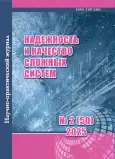MEANS OF IMPLEMENTING A NON-CONTACT METHOD FOR MEASURING TEMPERATURE DURING NON-DESTRUCTIVE TESTING OF THERMAL MODES OF ELECTRONIC MEANS
- Authors: Beisembayeva B.S.1, Goryachev N.V.2, Lysenko A.V.2, Trusov V.A.2, Yurkov N.K.2
-
Affiliations:
- Academy of Civil Aviation
- Penza State University
- Issue: No 2 (2025)
- Pages: 47-55
- Section: DESIGN AND TECHNOLOGY OF INSTRUMENTATION AND ELECTRONIC EQUIPMENT
- URL: https://journal-vniispk.ru/2307-4205/article/view/294730
- DOI: https://doi.org/10.21685/2307-4205-2025-2-5
- ID: 294730
Cite item
Full Text
Abstract
Background. In the process of designing, testing and using electronic devices, the use of specialized temperature measuring devices is often mandatory. Depending on the stage of the life cycle of electronic equipment, different types of meters based on different physical principles of operation can be used. Modern metrology identifies two fundamental approaches to temperature measurement: the contact method (with direct interaction with an object) and the non–contact method (non-destructive testing). This study focuses on contactless measurement techniques, and provides a detailed analysis of two different types of contactless measuring devices, each with unique characteristics and applications. Materials and methods. The research is based on the theoretical and practical aspects of the process of non-destructive temperature control and the methodology of thermophysical design of electronic equipment and devices. Results and conclusions. The advantages and disadvantages of pyrometric and thermal non–contact temperature meters are considered in detail, an example of a modern integrated pyrometric meter is given, and two of the most common electronic devices for non-contact temperature measurements are considered – a pyrometer and a thermal imager. In conclusion, the authors substantiate the use of an information and measuring system for non-destructive temperature control in the design of radioelectronic devices, together with software tools for thermophysical design.
Keywords
About the authors
Bakytgul S. Beisembayeva
Academy of Civil Aviation
Author for correspondence.
Email: b.beisembayeva@agakaz.kz
Senior lecturer of the sub-department of aviation engineering and technology
(44 Akhmetov street, Almaty, Kazakhstan)Nikolay V. Goryachev
Penza State University
Email: ra4foc@yandex.ru
Candidate of technical sciences, associate professor, associate professor of the sub-department of radio equipment design and production
(40 Krasnaya street, Penza, Russia)Aleksey V. Lysenko
Penza State University
Email: luysenko_av@bk.ru
Candidate of technical sciences, associate professor, associate professor of the sub-department of radio equipment design and production
(40 Krasnaya street, Penza, Russia)Vasily A. Trusov
Penza State University
Email: kipra@mail.ru
Candidate of technical sciences, associate professor, associate professor of the sub-department of radio equipment design and production
(40 Krasnaya street, Penza, Russia)Nikolay K. Yurkov
Penza State University
Email: yurkov_NK@mail.ru
Doctor of technical sciences, professor, honoured worker of science of the Russian Federation, head of the sub-department of radio equipment design and production
(40 Krasnaya street, Penza, Russia)References
- Proshin A., Melnichuk A., Gerasimova Yu., Yurkov N. Principle of operation and means of implementing a noncontact method of temperature measurement. Innovatsionnye, informatsionnye i kommunikatsionnye tekhnologii: sb. tr. XVII Mezhdunar. nauch.-prakt. konf. (g. Sochi, 1–10 oktyabrya 2020 g.) = Innovative, information and communication technologies : proceedings of the XVII International Scientific and Practical Conference (Sochi, October 1-10, 2020). Moscow: Assotsiatsiya vypusknikov i sotrudnikov VVIA imeni professora N.E. Zhukovskogo sodeystviya sokhraneniyu istoricheskogo i nauchnogo naslediya VVIA imeni professora N.E. Zhukovskogo, 2020:440–444. EDN: KZQIGD
- Sementsov S.G., Gridnev V.N., Sergeeva N.A. Investigation of the influence of temperature conditions on the reliability of electronic equipment by thermal imaging methods. Trudy Mezhdunarodnogo simpoziuma Nadezhnost’ i kachestvo = Proceedings of the International Symposium Reliability and Quality. 2016;2:6–10. (In Russ.)
- Garelina S.A., Latyshenko K.P., Frunze A.V. Comparative analysis of energy pyrometers and spectral ratio pyrometers. Pozharnaya bezopasnost': problemy i perspektivy = Fire safety: problems and prospects. 2017;1(8): 417–420. (In Russ.)
- Gulyaev I.P., Dolmatov A.V., Berestok G.M. Optimization of temperature measurements with a spectral pyrometer based on MATLAB. Mnogoyadernye protsessory, parallel'noe programmirovanie, PLIS, sistemy obrabotki signalov = Multi-core processors, parallel programming, FPGAs, signal processing systems. 2016;1(6):201–207. (In Russ.)
- Vesnin V.I., Prilepskiy A.S. Errors in measuring temperature with an infrared pyrometer. Traditsii i innovatsii v stroitel'stve i arkhitekture. Estestvennye nauki i tekhnosfernaya bezopasnost': sb. st. = Traditions and innovations in construction and architecture. Natural sciences and technosphere safety : collection of articles. Samara, 2017:177–181. (In Russ.)
- Semeshina N.I., Grishina S.Yu. Thermal imager in construction. Studenchestvo Rossii: vek XXI: sb. materialov III molodezh. nauch.-prakt. konf. = Russian students: Century XXI : collection of materials of the III youth. scientific and practical conference. Orel, 2016:311–312. (In Russ.)
- Kabaeva O.N., Sadovnikov I.V. Thermal imager in the modern world. Nauchnaya diskussiya: voprosy tekhnicheskikh nauk = Scientific discussion: issues of technical sciences. 2016;(2):76–81. (In Russ.)
- Koshkin S.Yu. Thermal imager. Selection criteria. Vodoochistka = Water treatment. 2019;(7):47–53. (In Russ.)
- Dul'nev G.N. Teplo- i massoobmen v radioelektronnoy apparature: uchebnik dlya vuzov = Heat and mass transfer in radioelectronic equipment : textbook for universities. Moscow: Vyssh. shk., 1984:247. (In Russ.)
- Goryachev N.V. Thermal model of a replaceable unit of the object under study. Trudy Mezhdunarodnogo simpoziuma Nadezhnost’ i kachestvo = Proceedings of the International Symposium Reliability and Quality. 2012;1:263. (In Russ.). EDN: PCBXGH
- Rybakov I.M., Goryachev N.V., Kochegarov I.I. et al. Application of the model of the printed circuit board with regard to the topology of external conductive layers for calculation of the thermal conditions of the printed circuit board. Journal of Physics: Conference Series (Tomsk, September 21–26, 2016). Bristol: IOPscience, 2017:012130. doi: 10.1088/1742-6596/803/1/012130 EDN: YVQINH
- Goryachev N.V., Yurkov N.K. Improving the structure of a modern information and measurement complex. Innovatsionnye informatsionnye tekhnologii = Innovative information technologies. 2013;(2-3):433–436. (In Russ.). EDN: QCWBSP
- Goryachev N.V., Grab I.D., Lysenko A.V., Yurkov N.K. The structure of the automated laboratory for heat sink research. Trudy Mezhdunarodnogo simpoziuma Nadezhnost’ i kachestvo = Proceedings of the International Symposium Reliability and Quality. 2011;2:119–120. (In Russ.). EDN: NWZBOT
- Goryachev N.V., Yurkov N.K. Software tools for thermophysical design of printed circuit boards of electronic equipment. Molodoy uchenyy = Young scientist. 2013;(10):128–130. (In Russ.). EDN: RHJJSJ
Supplementary files





















